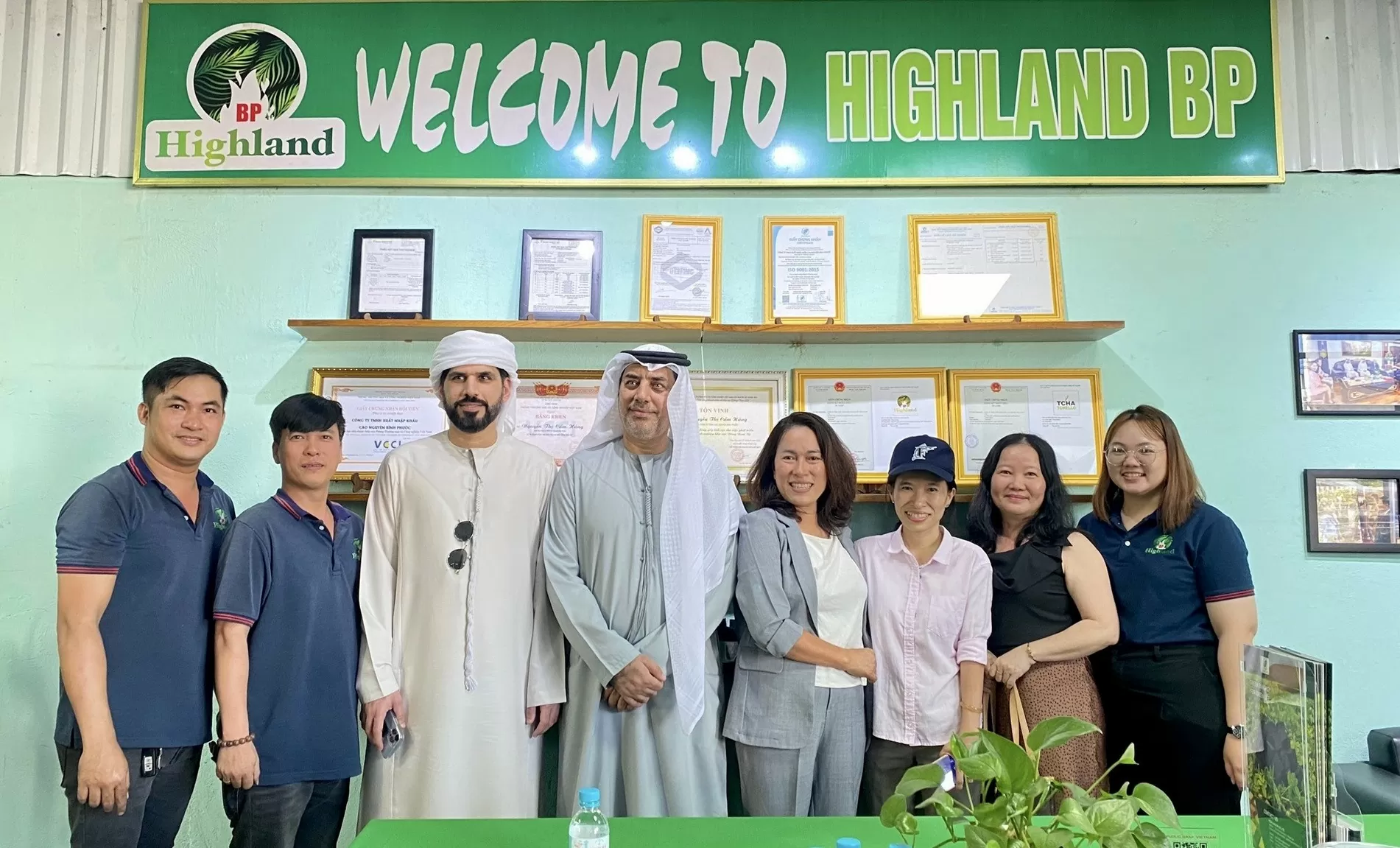
Building a 'fleet' to expand Vietnamese goods in the Halal market
Latest
This is the advice from Ms. Nguyen Thi Cam Hang, Founder and Chairwoman of the Cao Nguyen Binh Phuoc Export-Import Co., Ltd. (HighlandBP), a company engaged in the Saudi Arabian and UAE markets, to Vietnamese businesses aiming to penetrate deeper into the Halal market.
Could you share more about your coconut shell charcoal product, which has been exported to markets like Saudi Arabia, the U.S., Germany, and Brazil?
Coconut shell charcoal is made from 100% natural coconut shells, and compressed into briquettes without any additives such as kerosene, sawdust, or limestone. This product is safe for users, environmentally friendly, and more economical compared to other alternatives.
 |
| Mrs. Nguyen Thi Cam Hang, Founder and Chairwoman of the Cao Nguyen Binh Phuoc Export-Import Co., Ltd. (HighlandBP). |
It is packaged in eye-catching designs and is versatile for various uses. The charcoal is soot-free, durable, and resistant to breakage during transportation, making it convenient for shipping and storage.
Its superior characteristics include higher heat output, longer burning time, minimal ash production, and no carbon emissions when burned. These advantages have made it increasingly popular in domestic and global markets, especially in countries like Saudi Arabia, UAE, Israel, Palestine, the U.S., Germany, Japan, and Taiwan (China).
In these markets, coconut shell charcoal is not only used for cooking and BBQ but also for water filtration, air purification, and medical purposes.
Halal is currently a promising market for export industries, particularly food and agriculture. What is your assessment of this market? Are there challenges involved?
The Halal market offers immense opportunities for exports, especially in food and agriculture, due to its high consumption demand and large population. With over 2 billion people, it is a lucrative market that businesses eagerly seek to enter.
However, the challenges are equally significant.
To operate in this market, businesses must comply with stringent Halal standards, covering production, processing, and packaging, along with obtaining Halal certification.
This is also a competitive market attracting numerous international players, requiring businesses to continuously improve quality. To succeed in this market, businesses must invest in quality, certification, and a deep understanding of market requirements for sustainable development.
Saudi Arabia is a leading Islamic country and the economic hub of the Middle East. As a company working with this market, what is your assessment of its potential? What should businesses do to introduce Halal products here?
Saudi Arabia, with its high consumption demand and role as the economic center of the Middle East, represents a significant and promising Halal market, especially in food and agriculture.
The strong friendship and cooperation between Vietnam and Saudi Arabia offer great opportunities for high-quality products, particularly Halal-certified foods.
Saudi Arabia's economic potential, large market size, loyalty to partners, adherence to religious rules, and professionalism make it an attractive market. However, its close ties with the global market also make competition intense.
To succeed in Saudi Arabia, Vietnamese businesses must ensure their products fully meet Halal standards, demonstrate professionalism, and commit to quality and quantity. These are crucial for building consumer trust.
Additionally, understanding local consumer preferences and tastes is essential for market alignment. Establishing strong relationships with local partners to expand distribution channels, optimize costs, and maintain consistent product quality is also vital for competitive success.
 |
| rs. Nguyen Thi Cam Hang and employees of the Cao Nguyen Binh Phuong Export-Import Co., Ltd. with partners from Dubai at a coconut charcoal production plant. (HighlandBP). |
The Prime Minister has issued a plan to enhance international cooperation for the development of Vietnam's Halal industry by 2030. From a business perspective, what are your suggestions for government agencies to support deeper market penetration?
To help Vietnamese businesses penetrate the Halal market, I propose the following support measures:
Firstly, facilitating Halal certification. The government should enable easier access to international Halal certification for businesses. This certification is a “passport” that determines whether Vietnamese products can enter Islamic markets.
Secondly, enhancing training and awareness. State agencies should organize specialized training courses on Halal standards for businesses, especially small and medium enterprises, to help them understand production and processing requirements.
Thirdly, strengthening international connections. The government should foster connections between Vietnamese businesses and international partners, organizing trade fairs, exhibitions, and promotional events to provide opportunities for engagement with Islamic markets.
Fourthly, policy support. The government should offer tax and financial incentives to Halal product manufacturers to reduce costs and encourage investment in this sector.
As a small yet "green" product, what are your expectations for its presence in the Halal market?
Coconut shell charcoal, though small in scale, embodies "green values" through its natural materials and eco-friendly production process.
This product aligns with the current trend of sustainable consumption, particularly in Halal markets, where consumers prioritize safe and environmentally friendly products.
Islamic countries like Saudi Arabia and other Gulf nations are promising markets for coconut shell charcoal, especially for applications like cooking, BBQ, air purification, and cosmetics production.
To succeed in these markets, the product must maintain sustainable quality, competitive pricing, and strict compliance with production standards. Innovation and technological improvements to enhance quality, productivity, and cost efficiency are also crucial.
Highlighting the product’s sustainability and eco-friendliness will attract the attention of Muslim consumers, who highly value these attributes.
Currently, HighlandBP's coconut shell charcoal is present in over 20 countries and territories, with plans to expand its market coverage annually. This demonstrates the sustainable growth of the industry, contributing to increased export value and promoting the sustainable development of Vietnam's agriculture sector.
Thank you!









